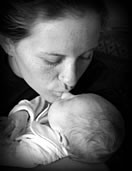 Scientists at the Universities of Liverpool, Manchester, and Kings College, London have found that mothers who stroke their baby’s body in the first few weeks after birth may change the effects that stress during pregnancy.
Scientists at the Universities of Liverpool, Manchester, and Kings College, London have found that mothers who stroke their baby’s body in the first few weeks after birth may change the effects that stress during pregnancy.
The study, which is published in full in the open-access journal PLOS ONE, shows that links between symptoms of depression in pregnancy and subsequent infant emotions of fear and anger as well as heart rate response to stress at seven months of age changed by how often a mother stroked her baby on the head, back, legs, and arms in the early weeks of life.
Scientists believe that stress in pregnancy can have an effect on an infant in later life by reducing the activity of genes that play a role in stress response. Studies of early care-giving in rats have found that high levels of mothers’ licking and grooming their pups soon after birth can increase the activity of these genes and may reverse the effects of prenatal stress on their offspring.
These initial findings in humans indicate that maternal stroking in infancy, as reported by mothers, has effects strongly resembling the effects of observed maternal behaviors in animals, pointing to future studies of the epigenetic, physiological, and behavioral effects of maternal stroking.
You can read the full research study here.
